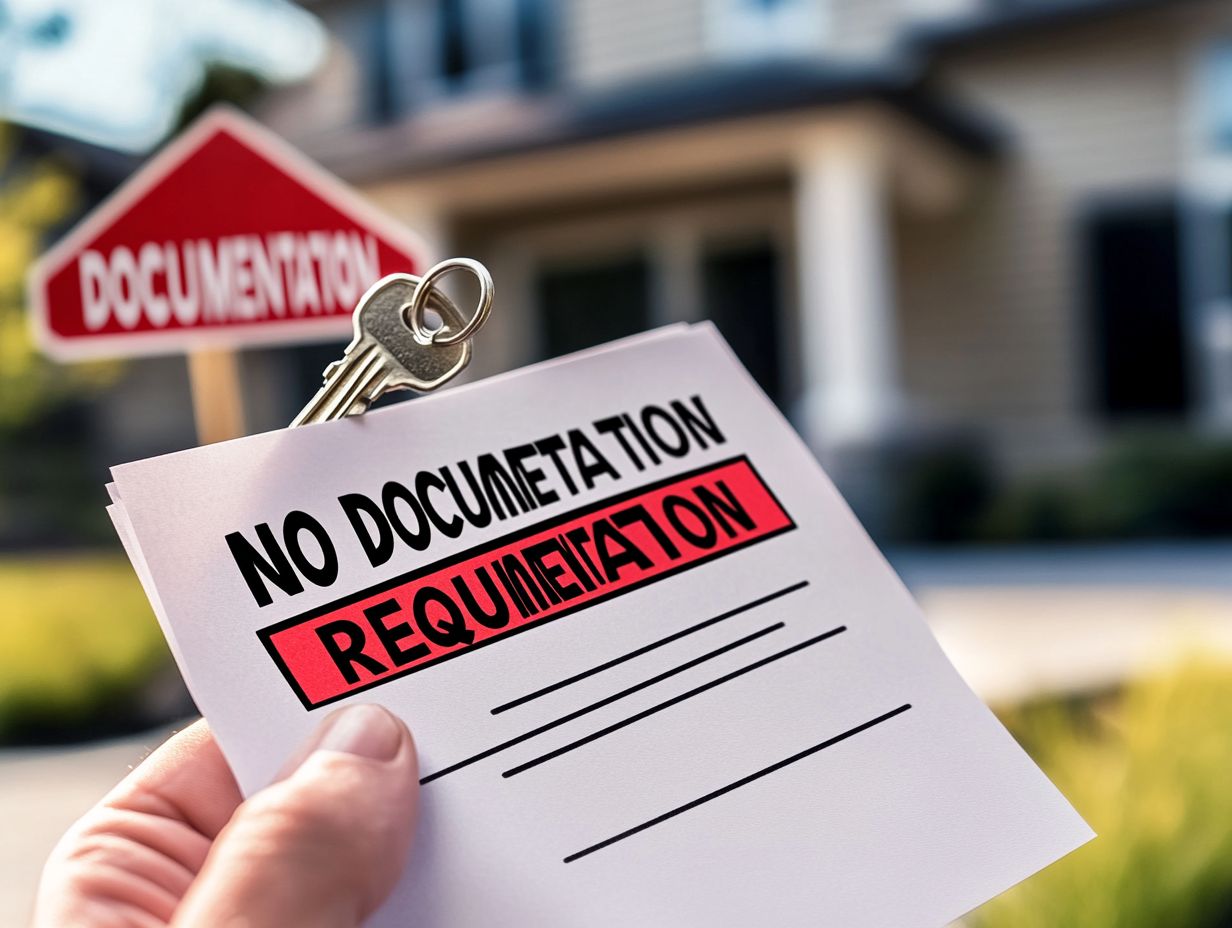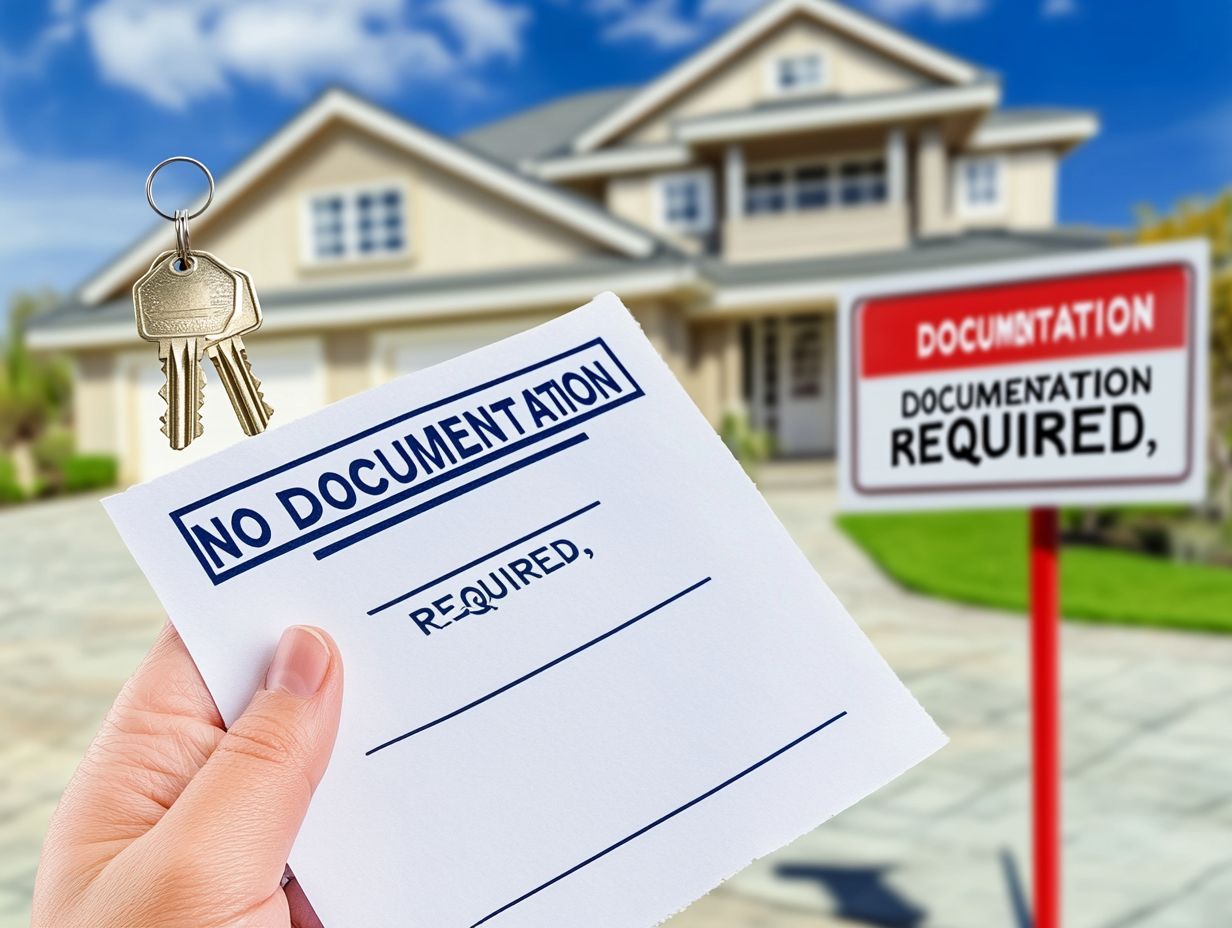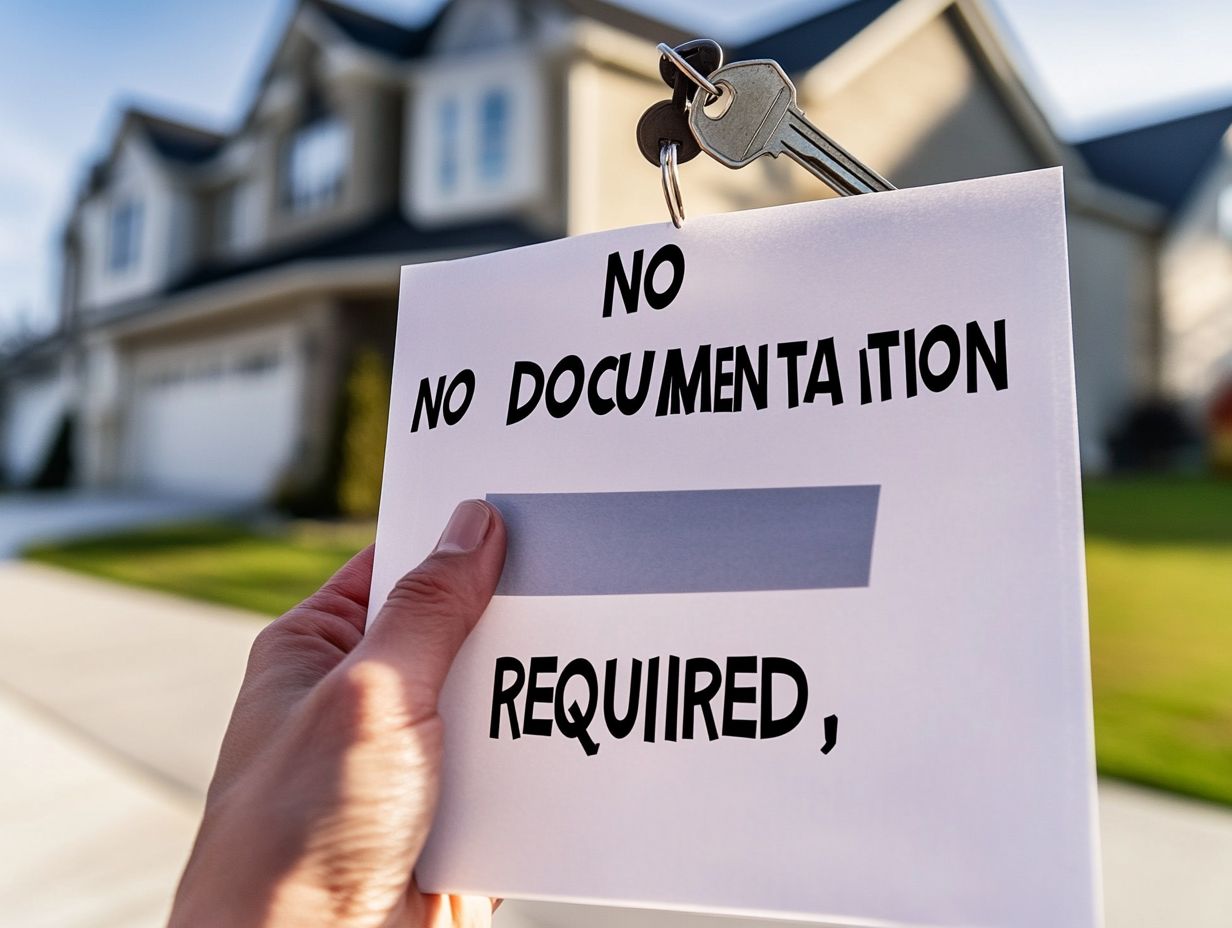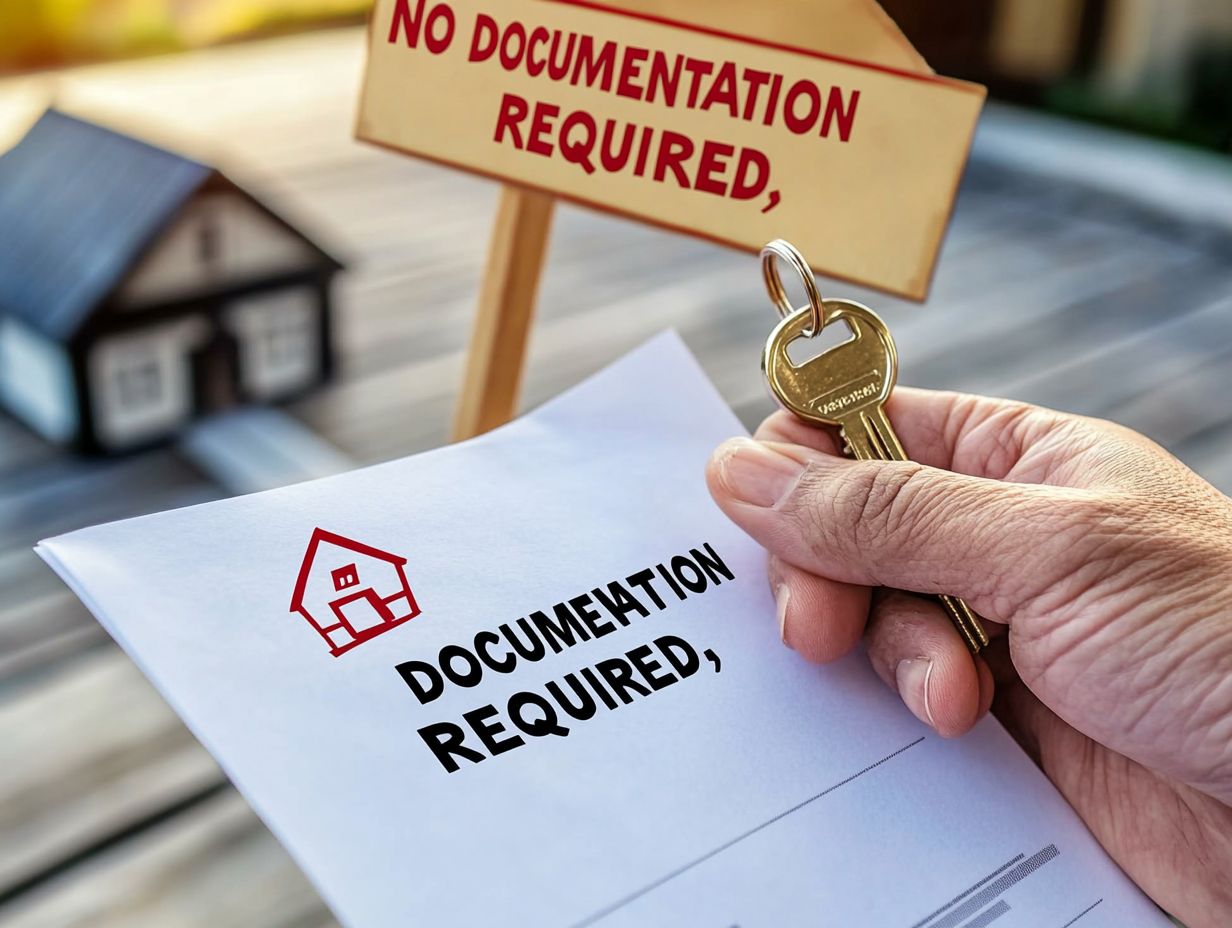What Is a No-Doc Mortgage?
Navigating the world of mortgages can feel overwhelming, especially for self-employed individuals or those with unique financial situations.
No-doc mortgages offer a flexible financing option that bypasses traditional documentation requirements. This article covers what no-doc mortgages are, how they work, and the eligibility criteria to consider.
You ll find a balanced discussion of the pros and cons, explore alternatives for high-income borrowers, and uncover potential risks. Understanding these elements empowers you to make informed decisions during your home-buying journey.
Contents
Key Takeaways:

A no-doc mortgage is a type of home loan that does not require traditional income and asset documentation from borrowers. These mortgages mainly target self-employed or high-income borrowers who struggle to provide standard documentation. While no-doc mortgages offer convenience and flexibility, they may come with risks such as higher interest rates and fewer loan options.
Understanding No-Doc Mortgages
No-doc mortgages, often called no income verification mortgages, cater to those seeking alternative financing options, particularly borrowers who may not meet conventional mortgage criteria.
This includes individuals with changing incomes or those who are self-employed. Special products like NINJA loans let you get home loans without all the usual paperwork.
Understanding these unique financing options is crucial for real estate investors and homebuyers looking for flexible solutions based on their financial situations.
How Do No-Doc Mortgages Work?
No-doc mortgages allow you to verify your income through alternative means, such as bank statements or liquid assets, instead of traditional paperwork. This flexibility is particularly beneficial for self-employed individuals and real estate investors who rely on rental income.
Lenders typically ask for different forms of proof, like bank statement loans or stated income loans, to evaluate your eligibility while allowing you to navigate the home loan approval process without the usual documentation challenges.
Eligibility and Application Process
Eligibility and application processes for no-doc mortgages can vary widely, influenced by the specific requirements set by lenders.
As a self-employed individual, you may face unique challenges during this process, especially since your income might not be as easily verifiable as that of traditional wage earners.
To qualify for a no-doc mortgage, you generally need a solid credit history often above 650. Lenders may also request documentation of your assets to ensure you can manage your mortgage payments comfortably.
During the application process, know exactly what you want in terms of loan amount and property value. Organizing your bank statements and any proof of consistent income, such as profit and loss statements, can significantly strengthen your application.
By presenting a well-prepared financial profile, you ll improve your chances of securing favorable terms. Act quickly to secure the benefits of a no-doc mortgage!
Pros and Cons of No-Doc Mortgages

No-doc mortgages come with a unique set of advantages and disadvantages that can significantly impact your financial decisions.
On the upside, these mortgages provide swift access to funds without the burden of extensive paperwork. This is particularly appealing if you have a strong credit score or the ability to make a substantial down payment.
However, it s essential to weigh the risks, including higher interest rates and increased scrutiny from subprime lenders. Given the financial crisis, entities like the Consumer Financial Protection Bureau have implemented more regulations, which can complicate matters.
Explore your mortgage options now to find the best solution for your needs!
Benefits and Drawbacks
The primary benefits of no-doc mortgages are swift funding and reduced documentation requirements. This offers you exceptional flexibility if you don t quite fit into the traditional lending mold.
This streamlined approach allows you to secure the financing you need with minimal delay, making it an appealing option for those facing time-sensitive opportunities.
However, this convenience often comes at a cost. These mortgages may carry higher interest rates compared to traditional loans, reflecting the increased risk that lenders take on.
The thorough risk assessment processes can lead to more stringent eligibility criteria, which might discourage some from exploring this avenue.
So, while the speed and ease of approval can be significant advantages, they come with potential financial implications that warrant careful consideration.
Alternatives to No-Doc Mortgages
For borrowers like you seeking financing options beyond no-doc mortgages, a range of alternatives can cater to your unique financial circumstances and requirements.
Traditional mortgages remain a favored choice, while government-backed FHA loans, VA loans, and USDA loans offer distinct advantages, particularly for first-time homebuyers or self-employed individuals.
By exploring these options, you can discover the best financing solutions tailored specifically to your needs in today s housing market.
Other Options for Self-Employed or High-Income Borrowers
As a self-employed or high-income borrower, you have an array of viable options beyond no-doc mortgages. FHA loans, VA loans, and specialized bank statement loans are tailored to meet your unique financial profile.
These alternatives provide the flexibility and accessibility that many self-employed individuals crave when pursuing home financing.
FHA loans are particularly appealing, as they require lower credit scores and down payments, making them a great choice for those with variable income.
If you re a veteran, VA loans offer competitive rates and no down payment, effectively removing significant barriers to homeownership.
Bank statement loans present another attractive option. They allow you to use your bank statements to verify income, providing a straightforward method to demonstrate financial stability without the hassle of traditional documentation.
Each of these options is designed to accommodate the unique situations and cash flow patterns of self-employed workers. This ensures you can secure the home you desire with favorable terms.
Potential Risks and Considerations

When exploring no-doc mortgages, be mindful of several critical factors and potential risks that could impact your financial stability and journey toward homeownership.
Financial institutions and lenders often impose stricter mortgage requirements due to the nature of these loans. It s essential for you to understand your choices in today s housing market.
Stay informed about changing regulations and lending practices. This will empower you to make well-informed decisions as you navigate this complex landscape.
Important Factors to Keep in Mind
When navigating the landscape of no-doc mortgages, it s crucial to remember several key factors that could greatly influence your financial stability.
First and foremost, understanding the terms of the loan is critical. Familiarizing yourself with the repayment timeline, associated fees, and potential penalties for late payments can help you avoid unexpected financial strain.
Pay close attention to interest rates, as they play a significant role in determining the total cost over the life of the loan. Being aware of both fixed and variable rates is crucial for making informed decisions.
Additionally, familiarize yourself with the practices of different lenders and the regulations governing this type of financing. This knowledge not only gives you the power in your decision-making but can also lead to more favorable borrowing outcomes.
Frequently Asked Questions
Curious About No-Doc Mortgages?
A no-doc mortgage is a type of home loan that does not require borrowers to provide extensive documentation of their income, assets, or employment history. This type of mortgage is also known as a “stated income” or “no-income verification” loan.
Who Qualifies for a No-Doc Mortgage?

Typically, self-employed individuals or those with non-traditional sources of income may qualify for a no-doc mortgage. They may have difficulty providing the necessary documentation for a traditional mortgage but still have the ability to repay the loan.
How Does a No-Doc Mortgage Work?
A no-doc mortgage allows borrowers to secure a loan without providing typical documents like pay stubs or tax returns. This is particularly helpful for those who may not have these documents readily available. Lenders rely on the borrower’s stated income and assets to determine their ability to repay the loan.
The lender may still verify the borrower’s credit score and employment status to ensure their ability to repay the loan.
What Are the Benefits of a No-Doc Mortgage?
One exciting benefit of a no-doc mortgage is the simple application process! This makes it easier for you to get the loan you need. A no-doc mortgage can also offer higher loan amounts and more flexible requirements for credit scores and down payments.
What Are the Drawbacks of a No-Doc Mortgage?
One of the main drawbacks of a no-doc mortgage is the higher interest rate. Since lenders are taking on more risk by not verifying the borrower’s income and assets, they may charge a higher interest rate to compensate. Borrowers who overstate their income or assets may face financial consequences if they are unable to repay the loan.
Is a No-Doc Mortgage Right for Me?
Whether a no-doc mortgage is right for you depends on your individual financial situation. If you are self-employed or have difficulty providing traditional documentation, a no-doc mortgage may be a viable option. Before applying, think carefully about the risks and what could happen if you can t repay the loan.






